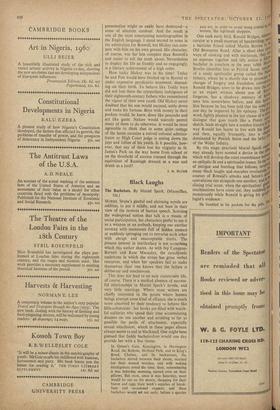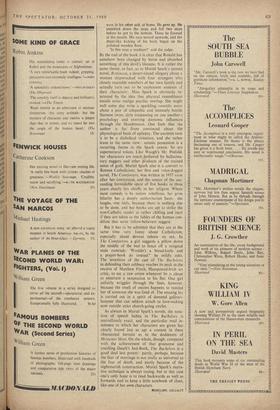Black Laughs
MURIEL SPARK'S gleeful and alarming novels are oddities, to put it mildly, and not least in their view of the motives of human speech. Scorning the widespread notion that talk is a means of social participation, her characters prefer to use it as a weapon or an ambush, keeping one another covered with statements full of hidden menace or suddenly springing out to terrorise each other with abrupt and unacceptable truths. The present interest in inarticulacy is not something which this author shares. As with Ivy Compton- Burnett and Rose Macaulay, the cataclysmic undertone in which she writes has great verbal resources, and when her speakers fail to make themselves clear one knows that the failure is deliberate and mischievous. This does not lead to an easy community life, of course. There is a marked absence of success- ful relationships in Muriel Spark's novels, and very little marriage. Where most writers are chiefly interested in the points where human beings attempt some kind of alliance, she is much more absorbed by their tendency to behave like fifth-columnists: her books are filled with watch- ful solitaries who spend their time accumulating dossiers on one another and avoiding as far as possible the perils of attachment, especially sexual attachment, which in these pages almost always seems to end in blackmail. One might have guessed that faddy bachelordom would one day provide her with a fine theme. In Queen's Gate, Kensington. in Harrington Road, the Boltons, Holland Park, and in King's Road, Chelsea, and its backwaters, the bachelors stirred between their sheets, reached for their wound watches, and with waking intelligences noted the time; then, remembering it was Saturday morning, turned over on their pillows. But soon, since it was Saturday, most would he out on the streets, shopping for their bacon and eggs, their week's supplies of break- fasts and occasional suppers; and these bachelors would set out early, before a quarter past ten, in order to avoid being jostled by tbl curator at a small museum of handwriting, Inht a barrister friend called Martin Bowles in lo Old Brampton Road. After a short chat ab°10 ways of cooking cod with marjoram, theYnnw. an espresso together and idly notice a f.,e""1.0 bachelor in conclave at the next table. Mar Bowles identifies him as Patrick Seton, nle,,r1;ja charges of forgery and fraudulent convers_,,I°0 of a seedy spiritualist group called the vuop Infinity, whom he is shortly due to prosecUte 0: forgeries, has a shadowy memory of 113',cry seen him somewhere before, and this boto dialogue that goes much like a. Pinter re, so sketch, leads straight into a sombre history of it of intrigue and humbug that follows, invo"ty Ronald Bridges, soon to be drawn into the '60.1 as an expert witness about one of Se1"41 one day be impaired by his epilepsy. Ille_ginic word, lightly planted in the last clause of a 04 way Ronald has learnt to live with his &sere and then, equally brusquely, into a ella,ro dominated by Patrick Seton and the larkY " which will develop the overt resemblance bet°00 many black laughs and macabre revelatioat, 0 courses of Ronald's attacks and Seton's LP' convulsions run alongside one another; and into closing trial scene, when the spiritualists' grilost EaaaaaamaaaiaaaaaaaallauanIalaanaaaaautaalalliill him because he has been told that his mind Pr of the Wider Infinity. may already have scented a device in the n;‘,P an epileptic fit and a spiritualist trance. In Ille,,,A machinations have come out, they sudderahcf monstrously while Ronald is giving his BOY logist's evidence: Ili4 One such early bird, Ronald Bridges, assi513,01 By this stage, practised Muriel Spark r---AAng women, the legitimate shoppers.
He fumbled in his pockets for the pills. , __------ 101 '
were in his other suit, at home. He gave up. He stumbled down the steps and fell two steps before he got to the bottom. There he foamed at the mouth. His eyes turned upwards, and the drum-like kicking of his heels began on the polished wooden floor.
'Is this man a medium?' said the judge.
By the end of the book it is clear that Ronald has somehow been changed by Seton and absorbed something of this devil's likeness. It is rather the same theme, in fact, as in Muriel Spark's second novel, Robinson, a desert-island allegory about a woman shipwrecked with four strangers who closely resemble members of her own family and actually turn out to be unpleasant annexes of their characters: Miss Spark is obviously in- terested by the idea that physical resemblance entails some malign psychic overlap. She might well some day write a sparkling comedic noire about a pair of telepathic and intensely hostile Siamese twins, slyly trespassing on one another's psychology and exerting daemonic influences through the bloodstream. One feels that the author is far from convinced about the physiological basis of epilepsy. The ancients took it to be a diabolical visitation, and she rather leans to the same view: satanic possession is a recurring theme in the Spark canon. So are supernatural voices. Like Waugh's Mr. Pinfold, her characters are much bothered by hallucina- tory naggers and other products of the trained sense of guilt. Muriel Spark also is a convert to Roman Catholicism; her first and voice-dogged novel, The Comforters, was written in 1957 soon after her -conversion, and the source of the suc- ceeding formidable spate of five books in three years clearly lies chiefly in her religion. Where most comedy is by nature rebellious, her grim hilarity has a deeply authoritarian basis: she laughs, one feels, because there is nothing else to be done, and her books are apt to strike the non-Catholic reader as rather chilling and inert if they are taken as the fables of the human con- dition that some fellow-believers suggest.
But it has to be admitted that they are at the same time very funny about Catholicism,
especially about devout taboos on sex. In
The Comforters, a girl suggests a pillow down the middle of the bed to fence off a resigned
male comrade. 'Wouldn't a bread-knife and
a prayer-book do instead'?' he mildly asks. The invention of the cast of The Bachelors
in defending their celibacy reaches its peak in the resolve of Matthew Finch, Hampstead-Irish art critic, to cat a raw onion whenever he is about to entertain a temptation in his flat. One girl unfairly wriggles through the lines, however, because the smell of onions happens to remind her of someone she was fond of. The ensuing lay is carried out in a spirit of damned gallows- humour that can seldom attach to love-making now outside strict church-going circles.
As always in Muriel Spark's novels, the nota- tion of speech habits in The Bachelors is marvelously exact, and the particular mad in- tentness to which her characters are given has clearly found just as apt a context in these obsessional hermits as in the dodderers of Memento Mori. On the whole, though, compared with the achievement of that gruesome and touching Death's Jest-Book, The Bachelors is a good deal less potent: partly, perhaps, because the fear of marriage is not really as universal as • the fear of death, and partly because of the nightmarish construction. Muriel Spark's narra- tive technique is always taxing. but in this case one's only hope is to read backwards as well as forwards and to keep a little notebook of clues, like one of her own characters.
PENELOPE GILL1ATT



















































 Previous page
Previous page